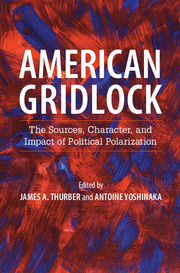Book contents
- Frontmatter
- Dedication
- Contents
- List of contributors
- Foreword
- Acknowledgments
- Introduction
- PART I POLARIZATION AMONG VOTERS AND ACTIVISTS
- PART II POLARIZATION IN NATIONAL INSTITUTIONS
- PART III POLARIZATION IN THE STATES
- PART IV POLARIZATION IN THE MEDIA
- PART V IMPLICATIONS AND CONCLUSIONS
- 16 Congressional Polarization and Its Connection to Income Inequality: An Update
- 17 The Sources and Impact of Political Polarization
- Index
- References
17 - The Sources and Impact of Political Polarization
from PART V - IMPLICATIONS AND CONCLUSIONS
Published online by Cambridge University Press: 05 November 2015
- Frontmatter
- Dedication
- Contents
- List of contributors
- Foreword
- Acknowledgments
- Introduction
- PART I POLARIZATION AMONG VOTERS AND ACTIVISTS
- PART II POLARIZATION IN NATIONAL INSTITUTIONS
- PART III POLARIZATION IN THE STATES
- PART IV POLARIZATION IN THE MEDIA
- PART V IMPLICATIONS AND CONCLUSIONS
- 16 Congressional Polarization and Its Connection to Income Inequality: An Update
- 17 The Sources and Impact of Political Polarization
- Index
- References
Summary
Partisan polarization has now been on the rise for several decades, and it has become a fact of life in twenty-first-century U.S. politics. At the elite level, the overwhelming evidence presented in this volume (and elsewhere) demonstrates clearly that our two major parties are ideologically as far apart as at any point in our natione's recent history. And at the mass level, while there are strong disagreements regarding the extent to which citizens are ideologically polarized along partisan lines and on a host of issues, it seems abundantly clear that the choices offered to them and the institutions (electoral, legislative, and others) in which social choices are made help to sustain – or at least fail to curb – partisan polarization.
That much seems fairly clear. When we commissioned the papers that form the basis for this volumee's chapters, we asked contributors to examine polarization among voters and activists, among the states, in various federal institutions, and in the media. Our goal was to bring together all these disparate strands into a single volume that would provide the most up-to-date political science scholarship on this very important question. We now have in a single volume the state-of-the-art in the literature on polarization.
What can we conclude on the basis of this extensive research? While the bulk of the literature agrees that polarization is an illness that plagues our current political system (though there are exceptions – as will be shown shortly), some of the chapters in our volume raise serious questions about whether polarization is always deleterious and whether some of the cures may be worse than the disease. To be sure, the vast majority of contributors are of the opinion that polarization hurts the operation of our democracy.
But as scholarship on this topic moves forward, we believe that the debate would benefit from more theoretical and normative discussions about the costs and benefits of partisan polarization as well as a more thorough examination of the conditions under which polarization hurts various constituencies and, conversely, the conditions under which some groups may actually benefit from polarization and, its offshoot, gridlock. If polarization is here to stay – and most contributors to this volume seem to think it is – then we must think of possible solutions.
- Type
- Chapter
- Information
- American GridlockThe Sources, Character, and Impact of Political Polarization, pp. 378 - 388Publisher: Cambridge University PressPrint publication year: 2015



